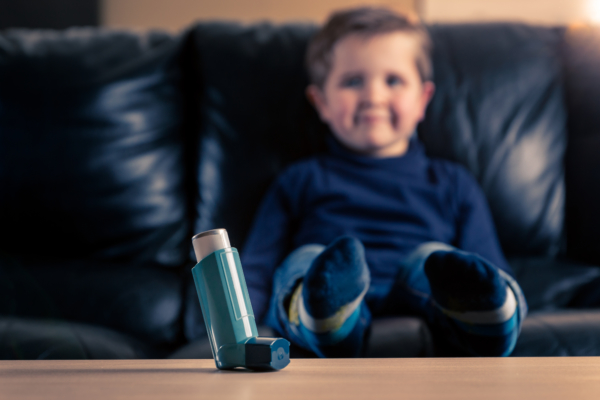Respiratory diseases affect parts of the body to do with breathing, like the lungs and airways. They include conditions like asthma, Chronic Obstructive Pulmonary Disease (COPD), Pulmonary Fibrosis, and pneumonia. 176,912 people are living with respiratory conditions, with 6 deaths every day due to respiratory diseases.
Thanks to the research you help us fund, more people than ever survive respiratory diseases. In the last eight years alone, your donations have allowed us to give nearly £1 million to research to tackle these conditions.
Read more about some of the respiratory research we fund below.

Research you fund could lead to new treatments for severe asthma.
Researchers at Queen’s University, Belfast are carrying out pioneering research that may lead to new medications for people with severe resistant asthma.
Neutrophils are a type of white blood cell that help heal damaged tissues and fight infections. In people with severe asthma, neutrophils attack the tissue in the airways. We don’t know why this happens. Dr Karim Dib and Professor Liam Heaney think that it is due to histamine – usually released by cells during an allergic reaction - produced by bacteria in the airways, and we funded them to investigate this further.
This study is the first to investigate whether blocking the histamine could help treat severe asthma. Severe asthma has a serious effect on the person’s quality of life, and can kill. Showing the link between histamine and neutrophils, and then developing medications to treat this, would reduce deaths, improve people’s quality of life, and help reduce the burden on carers and our healthcare services.
Dr Dib told us, “Our research has the promise to improve the medical condition of patients with severe forms of asthma. As a result, the daily life of these patients will be improved and less pressure will be put on carers”.
Research you fund could transform how we treat COPD
COPD (Chronic Obstructive Pulmonary Disorder) is a name used for a whole group of different lung conditions that can cause breathing difficulties. These breathing difficulties tend to get gradually worse over time and can limit your normal activities.
Dr Joe Kidney and his team at Queen’s University, Belfast have found high levels of a common herpes virus called Epstein Barr (or EBV) in the phlegm of people with COPD. They think that the inflammation of the airways associated with COPD might be due to this virus. We’ve funded them to check if this is the case, and the to investigate the effects of treating this virus.
COPD is the second most common cause of hospitalisation and the third most common cause of death across NI. If the researchers show that a virus is driving this disease, it could transform how we treat and even prevent COPD. EBV can be treated using Valaciclovir, which is used to treat cold sores, chickenpox and shingles. If EBV plays a role in COPD, then could Valaciclovir be a new treatment for COPD?

Research you fund will help us understand why young people take up vaping
E-cigs and vaping are the burning issue of the moment, but we still know very little about them. Research like this helps build our knowledge. That's why, with your help, we have funded this study.
The number of people who are using e-cigs (“vaping”) continues to grow, but there has been little research into why young people start, and continue, to vape. What do young people think about vaping? And what about their parents—what are their attitudes to vaping?
In 2016, your donations allowed us to fund researchers at Ulster University, led by Dr Liz Simpson, to study young people’s (and their parents’) attitudes to e-cigarette use. In this study, the research team wanted to find out how many 11-16 year olds used e-cigs, what they knew about e-cigs and the risks; and what generally influences a young person to take up vaping.
What did they find out? The researchers have finished their study and are due to publish their findings soon. Overall, they found that e-cig use amongst 11-16 year olds in Northern Ireland appears to be higher than in the rest of the UK. They also found that young people had mixed knowledge about e-cigs, and that teachers were struggling to find accurate information on e-cigarettes.
Once their findings are published, the research team hope to develop an educational resource for schools..
Research you fund will help people better manage their asthma.
Asthma is common condition affecting more than 120,000 people across N. Ireland. Around 5% of these would be considered to have severe asthma.
Recently, several new biologic medications – medicines made from the cells of living organisms - have become available which reduce asthma symptoms, flare-ups and hospitalisations. Continuing to take traditional asthma medication (“adherence”) is a well known issue. We still don’t know a lot about how these new biologics affect adherence, but it is likely that because they are so good at reducing symptoms, some people may feel that they do not need to use their regular medication as often, or at all. With your help, we’ve funded Dr. John Busby, at Queen’s University, Belfast, to investigate whether taking these new biologics affects adherence, and who is more likely to lapse.
If they find that adherence is a common problem when taking biologics, then strategies (e.g. motivational counselling or electronic inhaler monitoring) could be offered to help people improve their adherence. As a result, this would reduce severe asthma symptoms, flare-ups, and hospitalisations.

Research you fund is testing effective ways of helping pregnant women quit smoking.
The numbers of pregnant women across the UK smoking for part, or all, of their pregnancy are high. In Northern Ireland, about 15% of pregnant women report smoking at some time during their pregnancy. The risks of smoking during pregnancy are serious, but few of the UK’s current 130,000 pregnant smokers quit, despite free counselling and Nicotine Replacement Therapy services. This study tests whether offering financial incentives will help pregnant smokers kick the habit.
Professor Frank Kee, from Queen's University, Belfast, heads up the Northern Ireland arm of this study. Across the UK, researchers are examining whether offering shopping vouchers to pregnant women will encourage them to join – and stick with – smoking cessation services. The research team will follow the mums-to-be throughout their pregnancy and for 6 months after birth to check how effective the scheme has been.
If this scheme is effective, then more pregnant women will quit smoking during their pregnancy, and maybe for good. This has obvious health benefits to the mum and her child. Looking at the bigger picture, quitting is the single most important step you can take to protect your health, and reduce the risk of chest, heart, and stroke illnesses.

